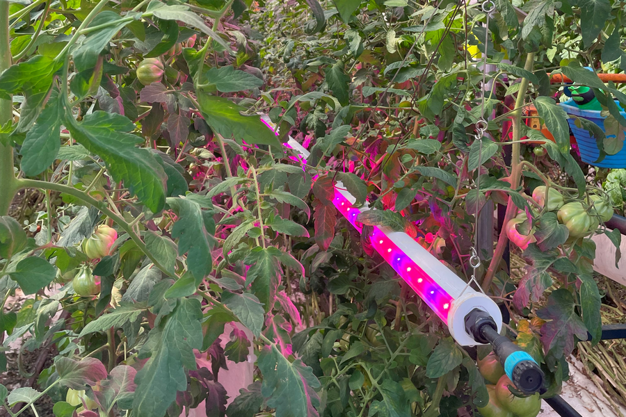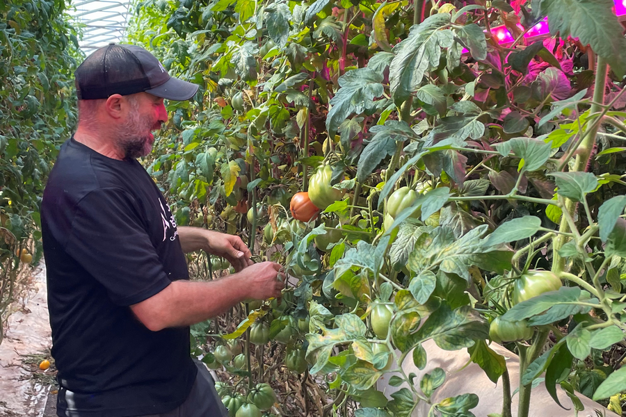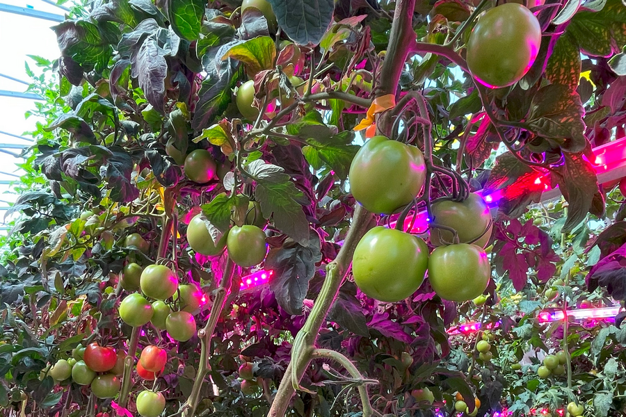In January 2009, Annie Lévesque and Frédéric Jobin-Lawler, both trained biologists, bought L'Abri Végétal. The small family farm in Compton, a small town in Quebec's Estrie region, specializes in growing organic vegetables in greenhouses.
The couple shares a love for the land and a desire to do things differently. So they set out to reinvent the operation, seeking ways to maximize production while respecting the environment.
The idea of investing in Arize Integral LED intra-canopy lighting took root during a Quebec Greenhouse Producers meeting. To the couple, the technology represented more than a simple innovation. It was a new way of optimizing growth and pushing the limits of what's possible on a small family farm.
Designed for multi-layer cultivation, intra-canopy lighting is installed within the foliage to maximize efficiency. Besides boosting production for mature crops, the light also ensures the young plants shaded under their mature counterparts, receive the light they need to develop.
Frédéric's academic background in plant science played a crucial role in their decision to adopt the technology. Studies reveal that a 1% improvement in light efficiency leads to a 1% increase in crop yield, provided other growth conditions are optimized. This insight was key in their decision to invest in the lighting system.
The project to modernize their farm happened in four stages, each marked by human and technical challenges.

The first stage was updating electrical installations: The first step was to modernize the electrical system to accommodate the three-phase network. The task took three years in collaboration with Hydro-Québec. It was a period of patience, where Annie and Frédéric learned to juggle the challenges of modernization with administrative realities.
The second stage was geothermal and luminosity analysis: To maintain optimal production during periods of low sunlight, they worked with university researchers to conduct geothermal and luminosity studies. This phase allowed them to find solutions to compensate for the lack of natural light in fall and winter while maintaining affordable costs.

The third stage was getting an MAPAQ subsidy: Faced with financial challenges, Annie and Frédéric applied for and received a MAPAQ subsidy via the P-SER Program. Besides giving the project a decisive boost, the financial support was seen as a symbol of their commitment to sustainable agriculture.
The final stage was the installation of intra-canopy lighting: In December 2023, with the help of Jordan Goulet and Gabrielle Verdon of Hort Americas Canada, Arize Integral LED intra-canopy lighting from Acuity Brands was installed and connected by an electrician. The date choice – just before the winter solstice – symbolized a new beginning for the farm.
Results came quickly. The farm's yields increased by 28%-34% for tomatoes and 40% for cucumbers. In winter, general production jumped by 60%, while maintaining stable energy consumption.
In fact, the new lighting system not only increased production, but quality improved in terms of size and taste.

"They [customers] were amazed by the quality of our vegetables," Frédéric added.
Instead of overusing resources or pushing LEDs to their full capacity, Annie and Frédéric opted for a slower, more sustainable growth strategy — one that prioritizes environmental stewardship over immediate returns.
"We wanted to do things well, without rushing," explained Frédéric, while talking about the choices they made throughout the journey.
The help of Jordan and the Hort Americas Canada team was essential throughout the project. Their advice on the choice of lighting fixtures and the light spectrum adapted to each crop helped ensure a successful installation. Annie and Frédéric view them as partners more than suppliers.
The project also benefits from ongoing academic support. Research teams from Laval University and the University of Sherbrooke are studying the effects of light treatments on various aspects, including Brix content (which measures sugar content) and overall efficiency per unit produced. These collaborations enrich the project and allow Abri Végétal to remain at the forefront of agricultural innovation.
For more information:
Hort Americas Canada
www.hortamericas.ca
